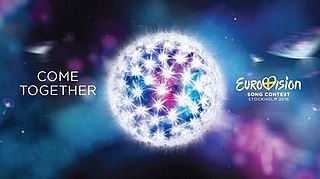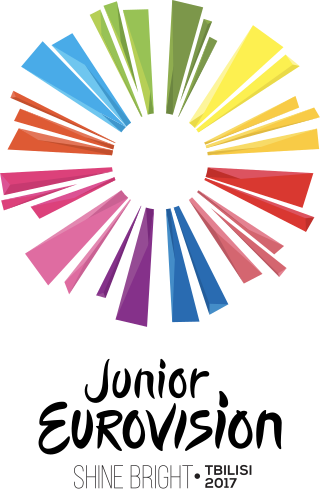
Slovenia has participated in the Eurovision Song Contest 29 times since its debut in 1993, having hosted a qualification round in Ljubljana for seven countries due to the influx of new nations wishing to join the Eurovision Song Contest. Having only missed the event twice in 1994 and 2000 due to the relegation rule after a poor average score in the 1990s, Slovenia's best result is seventh position achieved on two occasions; in 1995 with "Prisluhni mi" performed by Darja Švajger and in 2001 with Nuša Derenda and "Energy". Since the introduction of the semi-finals in 2004, Slovenia has qualified for the final on eight occasions. As of 2024, Slovenia has not made it to the top ten since their seventh place finish in 2001, only making it to the thirteenth position in 2002 and 2011.

North Macedonia has participated in the Eurovision Song Contest 21 times since its official debut in 1998. The country had attempted to participate in 1996, but failed to qualify from the audio-only qualifying round.

Montenegro has participated in the Eurovision Song Contest 12 times since its debut in 2007. Previously it had participated as part of Yugoslavia and as part of Serbia and Montenegro.

The Eurovision Song Contest 2016 was the 61st edition of the Eurovision Song Contest. It took place in Stockholm, Sweden, following the country's victory at the 2015 contest with the song "Heroes" by Måns Zelmerlöw. Organised by the European Broadcasting Union (EBU) and host broadcaster Sveriges Television (SVT), the contest was held at the Globe Arena and consisted of two semi-finals on 10 and 12 May, and a final on 14 May 2016. The three live shows were presented by Petra Mede and the previous year's winner Måns Zelmerlöw.
Australia debuted in the Eurovision Song Contest 2015 by invitation from the European Broadcasting Union (EBU) as a "one-off" special guest to celebrate the 60th anniversary of Eurovision. The country participated with the song "Tonight Again" written by Guy Sebastian, David Ryan Harris and Louis Schoorl. The song was performed by Guy Sebastian, who was internally selected by the Australian broadcaster Special Broadcasting Service (SBS) to represent that nation at the 2015 contest in Vienna, Austria. Sebastian was announced as the Australian representative on 3 March 2015 during a press conference in Sydney. The song Sebastian performed, "Tonight Again", was presented to the public on 16 March 2015. The Australian coloratura soprano of Armenian descent Mary-Jean O'Doherty also participated in the Eurovision Song Contest 2015 contest as part of the group Genealogy representing Armenia, but this marked the first time that the country has officially participated.
Australia participated in the Eurovision Song Contest 2016 with the song "Sound of Silence" written by Anthony Egizii and David Musumeci. The song was performed by Dami Im, who was internally selected by the Australian broadcaster Special Broadcasting Service (SBS) to represent that nation at the 2016 contest in Stockholm, Sweden. Im was announced as the Australian representative on 3 March 2016 during the Sydney concert of Conchita Wurst, Austria's Eurovision Song Contest 2014 winner. The song Im performed, "Sound of Silence", was presented to the public on 11 March 2016.

The Junior Eurovision Song Contest 2016 was the fourteenth edition of the annual Junior Eurovision Song Contest, which took place at the Mediterranean Conference Centre, in Valletta, Malta. This was the second time that Malta have hosted the Junior Eurovision Song Contest, their first being in 2014. Jon Ola Sand was appointed as the Executive Supervisor for the 2016 Junior Eurovision Song Contest, following the dismissal of the former supervisor, Vladislav Yakovlev.

The Eurovision Song Contest 2017 was the 62nd edition of the Eurovision Song Contest. It took place in Kyiv, Ukraine, following the country's victory at the 2016 contest with the song "1944" by Jamala. Organised by the European Broadcasting Union (EBU) and host broadcaster Public Broadcasting Company of Ukraine (UA:PBC), the contest was held at the International Exhibition Centre and consisted of two semi-finals on 9 and 11 May, and a final on 13 May 2017. The three live shows were presented by Ukrainian television presenters Oleksandr Skichko, Volodymyr Ostapchuk and Timur Miroshnychenko, being the first contest since the inaugural 1956 edition without a female host.

The Junior Eurovision Song Contest 2017 was the fifteenth edition of the annual Junior Eurovision Song Contest, organised by the Georgian Public Broadcaster (GPB) and the European Broadcasting Union (EBU). It took place on 26 November 2017 at the Olympic Palace, in the Georgian capital, Tbilisi. This was the fifth time that the contest was hosted by the previous year's winning country. The visual design and contest slogan, "Shine Bright", were revealed in May 2017.
Australia participated in the Eurovision Song Contest 2017 with the song "Don't Come Easy" written by Anthony Egizii, David Musumeci and Michael Angelo. The song was performed by Isaiah Firebrace, who was internally selected by the Australian broadcaster Special Broadcasting Service (SBS) to represent that nation at the 2017 contest in Kyiv, Ukraine. Firebrace as the Australian representative and the song he performed, "Don't Come Easy", was announced and presented to the public on 7 March 2017 during an announcement event in Melbourne.

The Eurovision Song Contest 2018 was the 63rd edition of the Eurovision Song Contest. It took place in Lisbon, Portugal, following the country's victory at the 2017 contest with the song "Amar pelos dois" by Salvador Sobral. Organised by the European Broadcasting Union (EBU) and host broadcaster Rádio e Televisão de Portugal (RTP), the contest was held at the Lisbon Arena, and consisted of two semi-finals on 8 and 10 May, and a final on 12 May 2018. The three live shows were presented by Portuguese television presenters Filomena Cautela, Sílvia Alberto and Catarina Furtado, and Portuguese-American actress Daniela Ruah, marking the first time that the contest was presented by four hosts.
Australia participated in the Eurovision Song Contest 2018 with the song "We Got Love" written by Anthony Egizii, David Musumeci and Jessica Mauboy. The song was performed by Jessica Mauboy, who was internally selected by the Australian broadcaster Special Broadcasting Service (SBS) to represent that nation at the 2018 contest in Lisbon, Portugal. Mauboy was announced as the Australian representative on 11 December 2017. The song Mauboy performed, "We Got Love", was presented to the public on 8 March 2018.
Australia participated in the Eurovision Song Contest 2019 with the song "Zero Gravity" written by Kate Miller-Heidke, Keir Nuttall and Julian Hamilton. The song was performed by Kate Miller-Heidke. The Australian broadcaster Special Broadcasting Service (SBS) organised the national final Eurovision - Australia Decides in order to select the Australian entry for the 2019 contest in Tel Aviv, Israel. Ten artists and songs competed in the national final and the winner was selected by a public and jury vote.
Australia originally planned to participate in the Eurovision Song Contest 2020 with the song "Don't Break Me" written by Jessica Cerro, Anthony Egizii and David Musumeci. The song would have been performed by Montaigne. The Australian broadcaster Special Broadcasting Service (SBS) organised the national final Eurovision – Australia Decides in order to select the Australian entry for the 2020 contest in Rotterdam, the Netherlands. Ten artists and songs competed in the national final and the winner was selected by a public and jury vote.
Australia participated in the Eurovision Song Contest 2021 with the song "Technicolour" written by Montaigne and Dave Hammer. The song was performed by Montaigne, who was internally selected by the Australian broadcaster Special Broadcasting Service (SBS) to represent that nation at the 2021 contest in Rotterdam, Netherlands. Montaigne was announced as the Australian representative on 2 April 2020 after they were due to compete in the 2020 contest with "Don't Break Me" before the 2020 event's cancellation. The song Montaigne performed, "Technicolour", was presented to the public on 4 March 2021.
Australia participated in the Eurovision Song Contest 2022 in Turin, Italy. The Australian broadcaster Special Broadcasting Service (SBS) selected Sheldon Riley with "Not the Same" to represent the country, after he won Eurovision – Australia Decides on 26 February 2022.
Armenia participated in the Eurovision Song Contest 2022 in Turin, Italy, with the song "Snap" performed by Rosa Linn. The internal selection of Rosa Linn as the Armenian artist in the 2022 contest was announced by the Armenian broadcaster Public Television of Armenia (AMPTV) on 11 March 2022, while the song "Snap" was later presented to the public on 19 March 2022.
Azerbaijan participated in the Eurovision Song Contest 2023 in Liverpool, United Kingdom, with the song "Tell Me More" performed by the duo TuralTuranX which was internally selected by the Azerbaijani broadcaster İctimai Television (İTV) to represent the nation at the 2023 contest. TuralTuranX's selection as the Azerbaijani Eurovision entrant was announced on 9 March 2023, while the song "Tell Me More" was presented to the public on 13 March 2023.
Australia participated in the Eurovision Song Contest 2023 in Liverpool, United Kingdom, with the song "Promise", written by Alex Canion, Ashley Doodkorte, Daniel Estrin, Scott Kay, and Simone Dow. The song is performed by Voyager. The Australian broadcaster Special Broadcasting Service (SBS) selected the Australian entry for the contest. The song and artist were officially revealed by SBS as the Australian entrant on 21 February 2023.
Australia participated in the Eurovision Song Contest 2024 in Malmö, Sweden, with "One Milkali " performed by Electric Fields. The Australian broadcaster Special Broadcasting Service (SBS) internally selected the Australian entry for the contest.
















